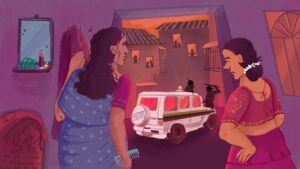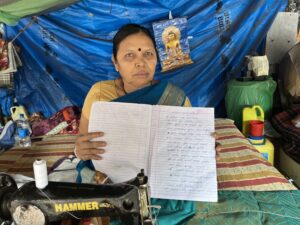Homes Marked ‘X’, Honnavar’s Women Fishers Live In A State Of Constant Dread
A long campaign against an upcoming port project has disrupted the lives of Kasarkod’s women fishers, leaving them in a constant state of anxiety and uncertainty
- Aisiri Amin
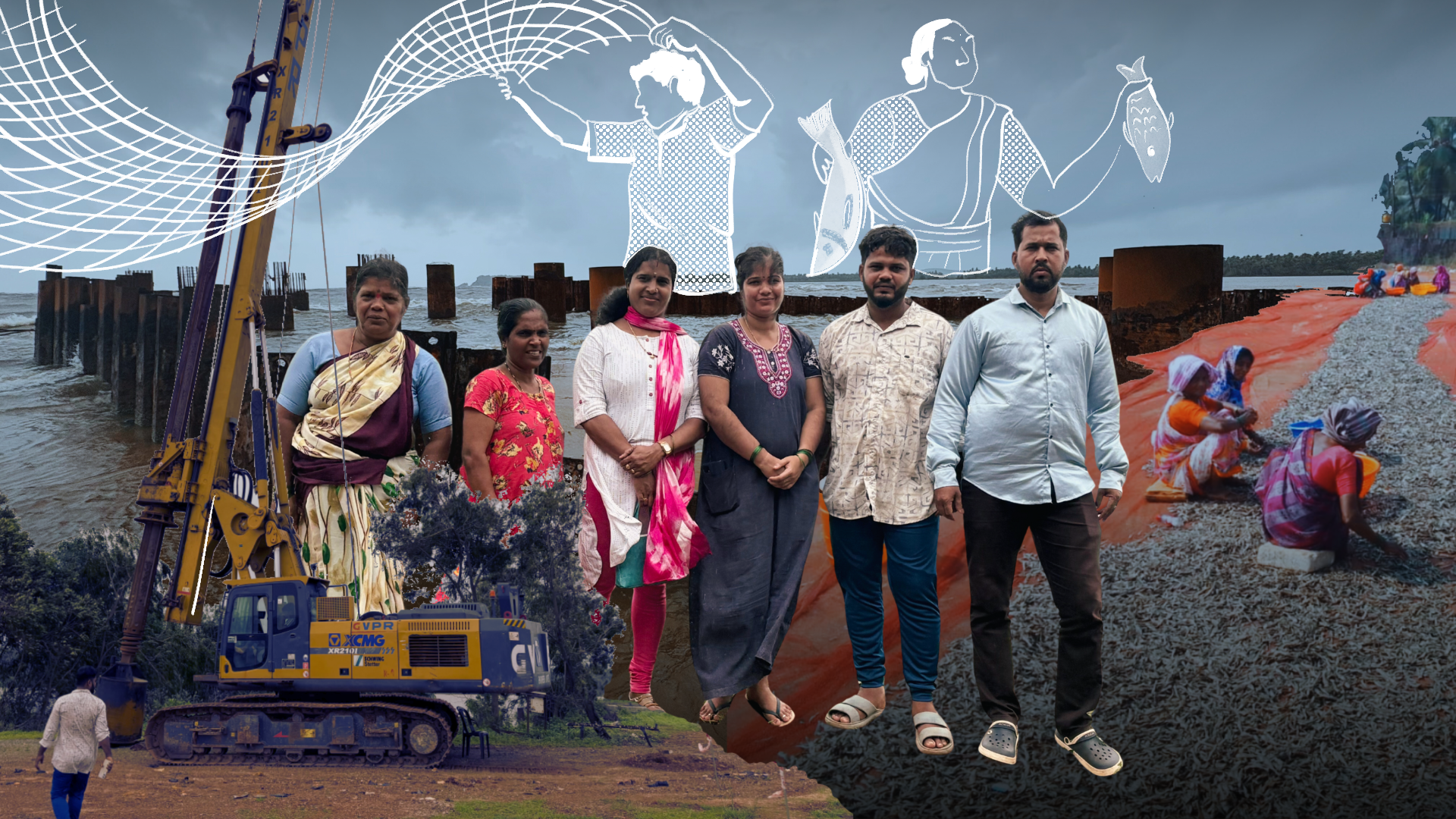
Gangi Ramachandra Tandel, 80, often sits at her doorstep, watching her great-grandchildren zoom in and out of their home in the fishing village of Kasarkod in the Uttara Kannada district. Neighbours stream in all day, some with food and others with stories. It’s the life she’s built for herself.
Now, she risks losing all of it to an upcoming port, just about 400 m from her home.
It took years of cutting back basic expenses for Gangi and her husband to build their house. When her husband passed away, her youngest child was just about 12. To keep food on the family’s plates, the mother of five has done it all: sell dry fish, load and offload fish from boats and even request fishers for some fish that she could sell.
However, she didn’t expect the fight to survive to continue into her 80s. About a two-foot pole smeared with red paint now stands in her verandah as a daily reminder that she could lose her house any day. It is one of many houses marked in Kasarkod Tonka 1 and 2 during a survey conducted in February this year. They will all be hit when the four-lane road connecting the port to National Highway 66 comes up.
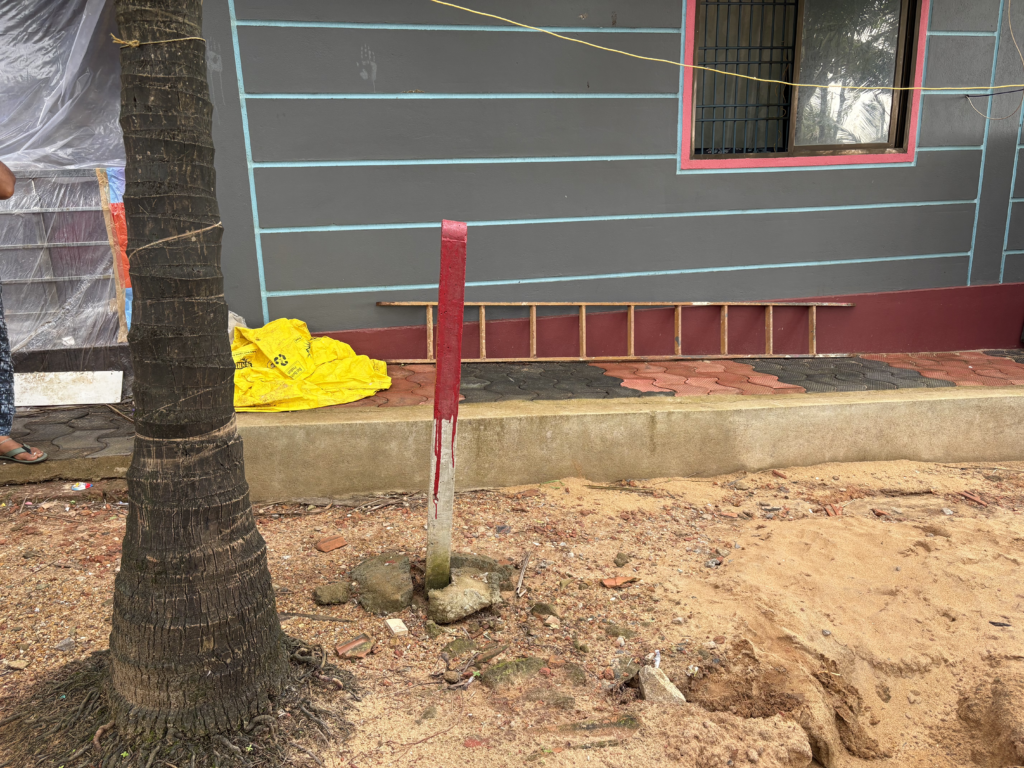
“When we first heard rumours about a construction project in the early 2010s, we thought it was a small project. No one told us what it actually was. We didn’t imagine it would put our homes and livelihood at risk,” says Raju Datta Tandel, Gangi’s grandson.
It was only nine years ago – when fishers were evicted from the drying area for the port development – that many realised the immense scale of the project. Gangi was one of the women fishers who regularly attended meetings in the village about the development. Since then, she has participated in peaceful protests and even walked to Honnavar from Kasarkod village to create awareness about it.
“We knew then the port would destroy our lives, and now my grandchildren are still fighting the same fight,” she says.
Despite being at the forefront of this resistance against the port for years, women fishers have been excluded from the discussions on the project by the State, court, port authorities, or even people’s representatives, says Vidya Dinker, a social activist and director of Growthwatch, a voluntary research and advocacy institution. “They have been erased even though they are the most affected,” she says.
As reported in the first part of the story, the upcoming ports in Kasarkod and neighbouring Keni threaten the livelihoods of thousands of women fishers while also endangering the nesting habitats of Olive Ridley turtles. This concluding part explores the harassment of protesting women fishers in Kasarkod, the losses they are incurring, and the profound effect that the fear of losing their homes has on their mental health.
Homes Under Threat
Girija Tandel, 62, too worked for decades, saving what she could to build her dream home. Her house, too, is marked for demolition, and anxiety looms over her entire family.
In February, Karnataka Port Officials conducted a survey to mark how much land would be required for the four-lane road. This was strongly opposed by the residents.
“Originally, we planned a 50-meter-wide road,” says Tarakesh Phayde, port engineer, Honnavar Private Port Limited (HPPL), which is building the port. “But since that would have affected 200 to 300 houses, we reduced it to 35 meters from the High Tide Line (HTL) as marked by the National Institute of Oceanography (NIO). In this area, only 101 structures have been identified.”
However, marine biologist Prakash Mesta questions the reliability of the NIO data since they did the marking in the non-monsoon time when the tides are not too strong. “Now, if you see the HTL poles have fallen during the monsoon,” says Mesta. “To understand the sea, you need a year – it should be a three-season database.”
The road construction was not disclosed in the port project’s initial environmental clearance application, the fishers argued in a 2022 petition. They also mentioned that the road falls within the no-development zone (NDZ) of Coastal Regulation Zone III (200m within the HTL).
Raghavendra Reddy, executive director of HPPL, claims that the 50m area stretching from the HTL belongs to the port authorities and that the constructions (meaning fishers’ homes) in that region are “illegal, as it’s not allowed to build anything along the port line”.
“The survey found that 85% to 95% of the people have illegally constructed within 35 meters only,” he says.
Sreeja Chakraborty, environmental lawyer, points to the 2013 Honnavar Port Limit notification, which states that the area 50m from the high-water mark (same as HTL used by Coastal Regulation Zone rules) belongs to the port, except for private and patta land (land grants by the government). “The fishers, by virtue of the 1979 order, are on patta land, so how are they illegal?” she asks.
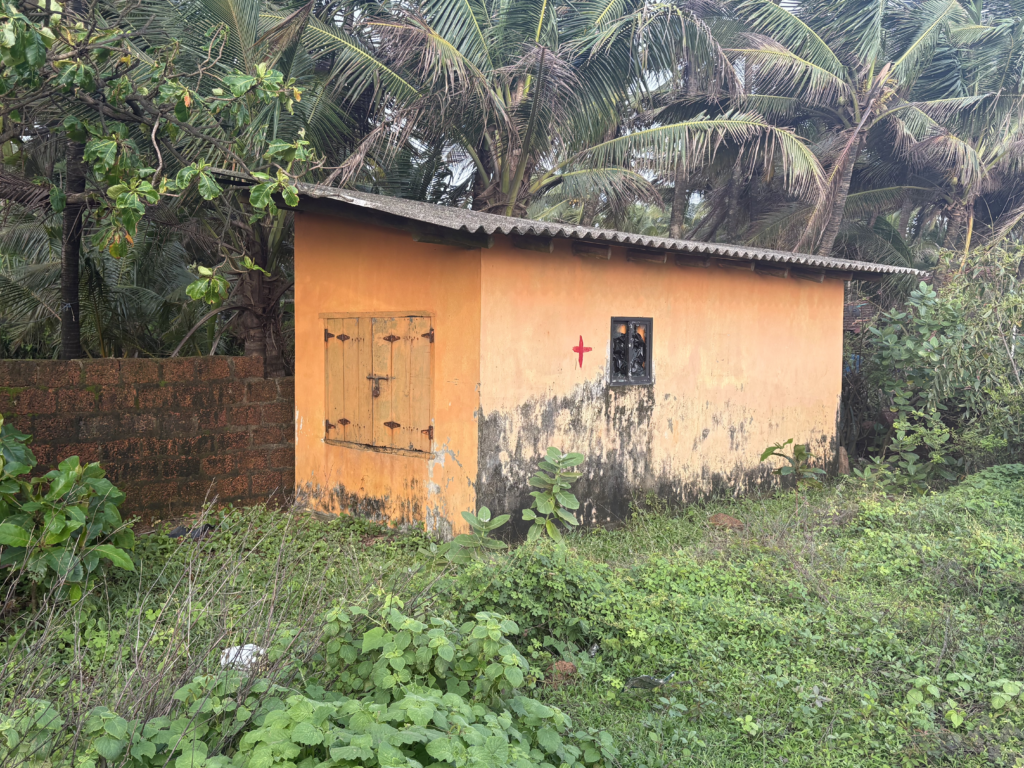
Among the 101 structures identified within the 35m during the survey this year, 81 are houses, Phayde says. “Only about 18 of them have patta,” he adds. However, the survey data haven’t been made available to the fishers yet, says Rajani Rao, activist and co-director of Growthwatch.
She also questions the source of this data. “During the survey or after, fishers’ land documents weren’t collected. So how do they know how many of them have pattas?” she asks. She further estimates that at least 200-300 houses will be affected within just the 35m area. “However, without the survey details, we can’t be sure, but we haven’t been given access to them,” she says.
Mesta, who has been helping the fishers sort out their land records, says that at least 600 residents in Kasarkod Tonka 1 and Tonka 2 have pattas.
Disappearance Of Tonka 1 and 2
“Since early 2024, fishers in Kasarkod have been sorting their land records and demanding a land survey. And since February a year ago, at least 297 people have sent applications for the survey to the Honnavar tehsildar’s office. But this request continues to be ignored,” says Chakraborty.
For them, a main concern and barrier has been the lack of access to survey 303, which, according to Mesta, has records of the land grants as well as areas marked as fishing grounds, knitting nets, and parking boats. “Now that survey is missing,” he says. “They are showing empty space to get permissions.” As explained in the first part, land survey numbers are unique numbers allotted to a specific piece of land by the state’s revenue department.
By missing, Mesta means that this survey 303 has disappeared from NCZMP maps. “They show Kasarkod Tonka 1 and Tonka 2, but there are no structures, houses, or people. We have just disappeared. But we are paying taxes, submitting address proof of this land to banks for loans, so how does this make any sense?” asks Renuka Tandel, one of the residents and Girija’s daughter-in-law.
According to official records, surveys 301, 302, and 304 exist, but survey 303 has now been classified as a river. The reemerged land that has been allotted for the port was designated as survey number 305 in 2014.
The fishers have asked the local tehsildar, who redirected them to the gram panchayat, who also repeated the same words: they do not have records of survey 303. Moreover, survey 303 was also not included in the environment clearance filed by HPPL in 2024, Chakraborty says.
Fighting Harassment
In the last decade, especially after 2020, there have been increased attempts to quell the fishers’ resistance movement through police presence, alleged false cases, and the denial of any kind of state support.
Over the last 10 years, it has become common for the residents of Kasarkod village to see a number of police personnel in the area. In 2021, the police came to supervise the demolition of a shed, where the fishers stored their boat equipment and nets. A year later, there was an attempt to construct the port road in the presence of about 600 police officers. During this time, women fishers who protested were injured and detained.
This year, on the morning of February 23, the fishers woke up to a police outpost installed in Kasarkod village without any notice. On February 24, around 8 pm, a verbal order for curfew was communicated through loudspeakers. The residents were informed that Section 144 would be imposed prior to a survey for the port-connectivity road the next day. Most residents weren’t aware of this until the morning of the survey; no written notice was given to the residents or the Gram Panchayat.
Frustrated by the uncertainty and lack of transparency, the women fishers began a peaceful protest in the morning. “The police had no nametags, and all of them were wearing masks. How is this legal?” asks Parvati Datta Tandel, 49, fisherwoman and Gangi’s daughter-in-law. Anyone who questioned was detained by the police, she adds.
“They also used such foul language that I can’t repeat it. They even told young children, ‘Why don’t you also jump into the river? That’s how they treat us,” says Heena Koser, 30.
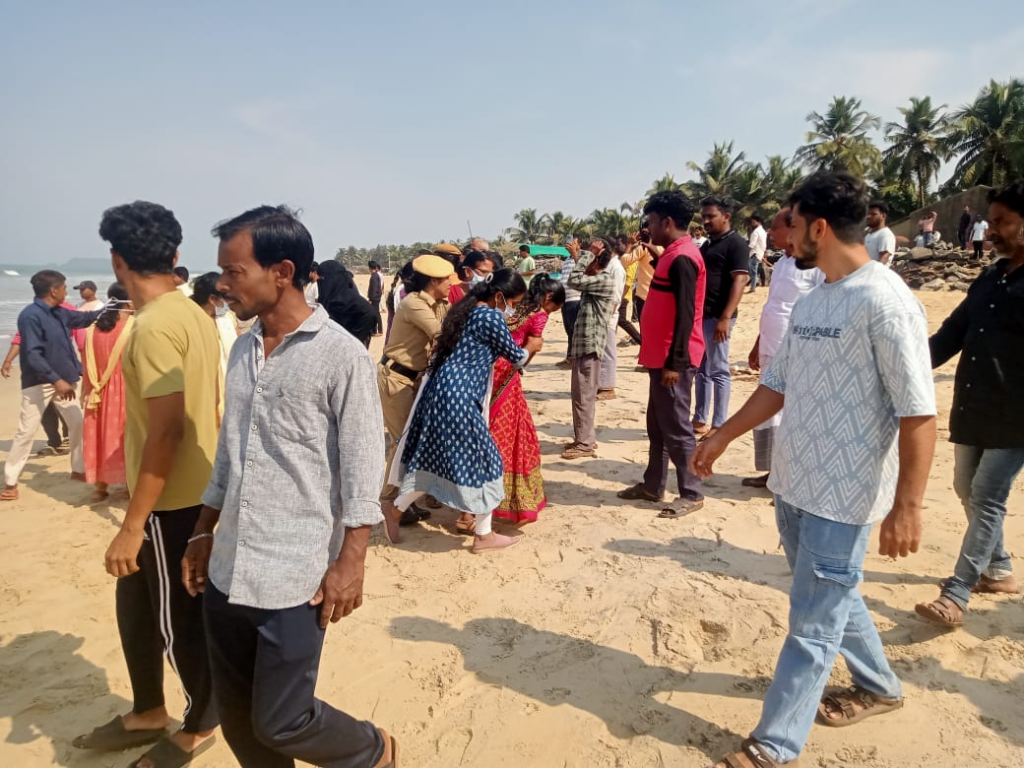
Women fishers, who have seen their mothers and grandmothers fight the same fight and with no end in sight, are struggling with mental health issues, especially frustration and exhaustion.
“These women fishers used to be happy, enterprising, hard-working, and full of life. Now, many of them are feeling helpless, with no sense of agency,” says Dinker, adding that the State is dismissive of the constitutional rights of the fishers.
Sitting across from her son, who has been beaten by the police and her mother-in-law, who continues to protest, Parvati says: “I am tired.” She brings her fist into her chest, moves it in circles and continues, “No one is listening to us, there is no support. We are constantly fighting for survival, and there is so much going on inside us. But we will not stop. We can’t.”
The women we interviewed spoke of constant anxiety about their livelihood, incomes, homes and the future of their children.
During the 2022 protests, among the women detained by police were a pregnant woman and a breastfeeding mother. Surekha*(name changed), who was about seven weeks pregnant, miscarried at the police station, says Renuka, who was also among the detained. “We asked for a pad for her and another woman who started menstruating at the police station. They took more than an hour to give us that. And they gave us only one pad each,” says Renuka. Surekha is still suffering from health issues.
Renuka’s sister-in-law, who was still breastfeeding her infant, requested permission to go home and tend to her child. Instead, the police turned up at her house to bring the child to the station, but Girija, her mother-in-law, refused. “How can we trust an infant with the police?” Renuka says.
During her detention in 2022, Renuka alleges that a male police officer held her by her hair and banged her head against the vehicle before pushing her in. The injuries still give her a headache, she says. But none of the injuries suffered by protesters were recorded by the medical examiner at the police station, she adds.
Between 2020 and 2025, the names of many Kasarkod fishers have been included in about 22 cases, with some, like Renuka’s, mentioned in five different cases. All, she maintains, are false and are not being produced in court at once, but are delayed to prolong their anxiety.
Every month, women fishers from Kasarkod make their way to court at least once or twice, if not more. The travel costs them about Rs 300 every day, and they spend another 100 on buying tea for their lawyer. “We also lose income for that day. Some months we have to go four times,” says Parvati, who has been named in at least three cases.
Enduring Losses
Rekha Tandel is no longer able to run her small business of making and selling prawn pickles along with dry fish. The work that earned her Rs 7,000 a month had given her independence and joy.
Today, with tests and medicines to treat her, the expenses have also shot up, says her husband Rajesh. Although not medically diagnosed yet, Renuka and Dinker worry that she is showing signs of depression, and they fear she is not the only one.
Many of the women fishers we interviewed said that every waking hour is filled with anxieties about their home and their family’s future, especially the children. There is a certain heaviness they all seem to carry, which they struggle to express. The State has overlooked all this for years.
It is not easy for the younger generation of the community either, having witnessed their parents and grandparents get arrested, beaten up and dragged to courts. Pratiksha Kharvi, who is aiming to be the first engineer in her family, says her studies have been affected.
“When exams are going on and protests happen, you know your family will inevitably join in because it’s a do-or-die situation. But I am worried all the time, and the constant movement of vehicles disturbs my studies,” she says.
There is surveillance that leaves the villagers disturbed. Along the road next to the Tonka 1 and Tonka 2 villages, a number of cameras have been mounted on poles, some of them just 50 meters apart. They were installed after the February protest, along with a new police outpost at the beginning of the road. “When a fallen camera was inspected by some residents, we found that it has a voice recording of up to 25 or 50 m as well as day and night vision,” Heena says.
There is also a police post at the turning towards the Tonka 1 and Tonka 2 villages. “We are constantly treated like criminals in our own home. Can you imagine the effect it has on us and our children?” Renuka says.
‘No Political Party Helps’
In its decade-long fight, the community has felt let down by all political parties. Be it the Bhartiya Janta Party’s Sunil Naik, who served as the Member of Legislative Assembly from 2018 to 2023 or the current MLA and minister for fisheries, ports and inland water transport, Mankal Vaidya, who took office in 2023.
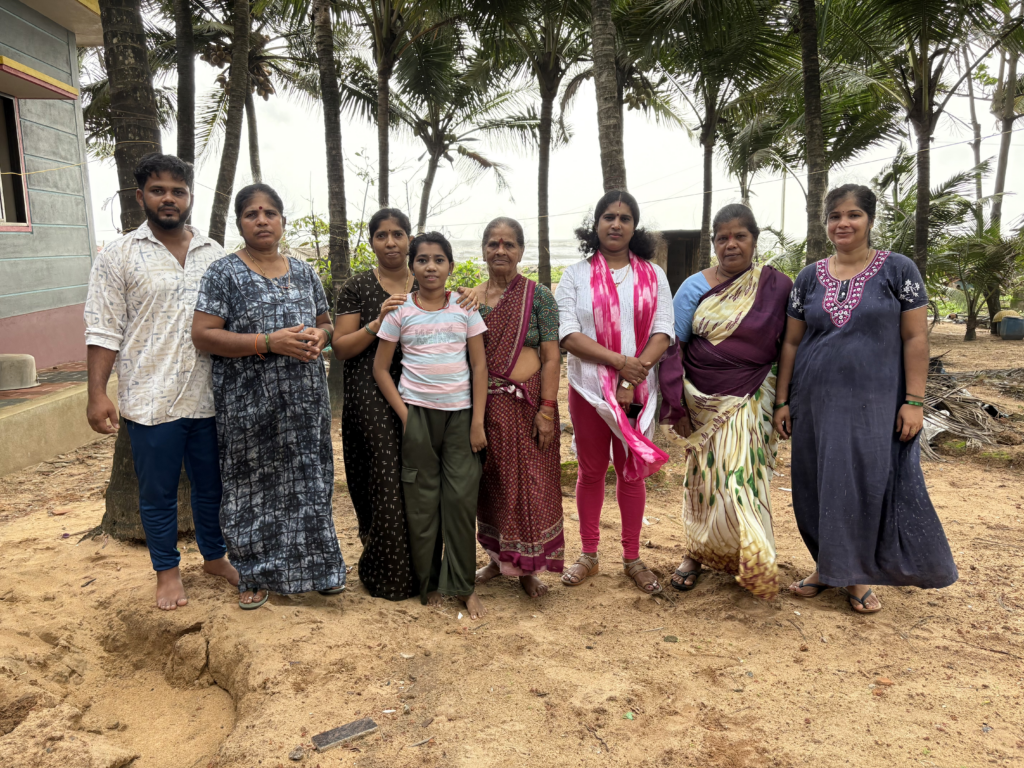
Since Vaidya belongs to the community, residents of Kasarkod had hopes that he would stand for them and even helped him in his election campaign. But the politician is no longer visible in the affected villages, they say.
Among the many frustrated residents is 18-year-old Apeksha, who questioned Vaidya on February 25 on a news channel about his absence. “He told us to vote for him [during the elections] and he’ll make sure that the bandar [port in Kannada] will not happen. Where is he now? Fishers are being dragged and put into jail,” she says in the video.
She adds: “Fisherfolk have no protection. Where should we go? If this is the case, then just kill us at once.”
We reached out to Vaidya but haven’t received a response yet. However, in 2023, showing his support for the project, he blamed the Centre for the delay in its construction. “Karnataka has 10 ports for development. Unless the government steps in to support the investors, who will invest here?” he said.
The fishers assert that the state government, HPPL, and other government authorities are working together to repress their resistance. Notably, in 2024, Reddy said that HPPL “would be forced to demand huge compensation” if the State government fails to implement the project.
“We have no one to turn to. But we will continue this fight, no matter what. This is for our children and grandchildren,” says Parvati.
We believe everyone deserves equal access to accurate news. Support from our readers enables us to keep our journalism open and free for everyone, all over the world.

